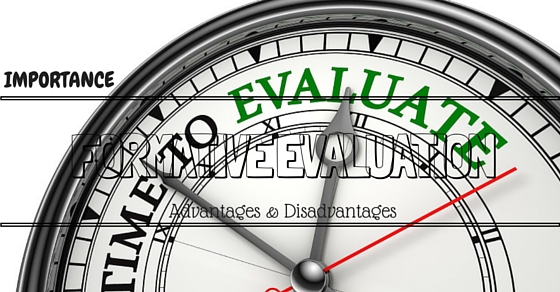Formative evaluation can be described for many scenarios for example in academics and work arena. A formative evaluation can be mentioned as one which happens before or during any project implementation with the motive to enhance project design and performance.
A formative assessment is far better in many ways than a summative evaluation and helps in finding out why a program doesn’t work. The main hindrance for a formative evaluation is that it does not require time and money and hence it is a barrier to undertake it.
It is equally important for people to view it as a mandatory program which brings about a successful outcome.

What is Formative Evaluation?
Formative evaluation is an evaluation which is used for learning. The main intention of a formative evaluation is to present a measure to both the students and instructor and find them where they stay in their course of study.
With this measure, the instructor would be able to adjust and make a few variations so that the studies aren’t affected. With the help of formative evaluations, more interest is presented by the instructor and students and their way of learning.
Why is the Formative Evaluation Important?
There are ample good reasons about the need for a formative evaluation which are penned down below. There are many chances where your project can be embarked and do not meet the real need when there is an absence of formative evaluation. Otherwise, the project can be constrained by other factors too which may not be controlled.
Formative evaluation is necessary and important for behavior change projects and community-engaged ones. This category of projects needs formative evaluation as they are complex and requires few monitoring processes. In order to face unexpected outcomes and respond to emergent properties, formative evaluation is mandatory.
When you’re unable to follow and capture successful feedback, formative evaluation can be followed as it enhances the implementation of the project. In this way, there are more chances to achieve the outcome of the project.
The various process changes are well understood with the help of formative evaluation. The actual reason for what works, what doesn’t work and why such things happen are found out with the help of formative evaluation. In this way, the project can be made successful by gathering more knowledge required and enhance future project design and implementation.
Advantages of Formative Evaluation:
There are a number of advantages when the formative evaluation is considered, a few points are jotted down for your reference.
1. Develops knowledge:
The main intention of formative evaluation is that it helps in the development of knowledge and skills for the learners. With this category of evaluation, the instructors, leads or teachers are able to identify the needs of the individuals and direct them towards their objectives or educational goals.
The individual’s hindrances and difficulties are found out by this method and appropriate remedies are applied to overcome them. With evaluation, the upcoming lesson or task is also planned. With formative evaluation, an assessment is offered by the instructor or teacher to make sure that the individuals have mastered the concept that has been taught to them.
2. Plans for the future:
Formative evaluation is beneficial as it plans for the future where any methods related to teaching or other career tasks can be altered. Weakness is diagnosed at an early stage and remediation is made.
By this way, the individuals are kept of track and move towards progress with continuous feedback. Future planning in case of any change in the methods of teaching or given task is planned well ahead, with formative evaluation.
3. Achieves successful outcomes:
A formative evaluation covers up a wide range of diagnostics that are required by the students or individuals. The feedback is the main parameter which enables students to reflect what they are learning and know the reason for the same. Formative evaluation assists individuals in enhancing their performance and producing successful outcomes.
4. Continuous improvement:
The other main beneficial aspect of a formative evaluation is that it is an ongoing process. By this way, the feedback is increased and issues are detected at an early stage. When academics are considered, conceptual errors are identified before they start by working with their term papers. Once they initiate with term paper they are guided and validated by their instructors with each step.
5. Provides rich picture:
A rich picture of the source or program is learned with the help of formative evaluation as it unfolds. With this type of evaluation, doors are opened for prospective learning for present program as well as future programs that are planned. The success and failure of the project can be determined with the help of formative evaluation and the reason for the same is also identified.
The complex factors that are present within the program is also identified with this evaluation. With the help of formative evaluation, the reason for the theory to be flawed or if the evaluation was deficient can be found out.
6. Provides quick feedback:
Reflective practice is assisted with the help of formative evaluation, also conflict management systems are strengthened in a number of ways and few of them are mentioned.
The major advantage is that with the help of formative evaluation, quick feedback is offered based on conflict management and resolution work capacity. For example, when a project is in process, the formative evaluation is one that offers complete feedback about the status of the project.
7. Documentation:
The next key beneficial factor about formative evaluation is that documentation is offered with this type of evaluation as to the working status of resolution and conflict management. Also, it provides with the techniques that are employed with the work issues that are identified, and impacts that are achieved in the early and middle stage of the process. This documentation is beneficial for a number of factors.
8. Setting goals and plans:
With the help of formative evaluation, planning is made and also revisions for any recommendation for plans are allowed. With this type of evaluation program implementation and program, plans are compared. There is also enhanced opportunity for reconsidering program plans and goals.
When program plans are revised and presented by means of formative evaluation, individuals who work with the program can revise plans or also stick to new or old plans that are appropriate to present reliabilities. The formative evaluation also offers inputs for future project planning and ideas.
9. Used in complex settings:
Complex intervention in complex settings is quite difficult to be implemented. Another tough task is the managers, researchers, and others to possess a complete understanding about what must be implemented, the best strategy to be followed, elements those hinders or facilitate the process and the reason for any strategy to work or not work in an implementation process. All these queries are solved with the help of formative evaluation.
10. Complex interventions are refined:
Formative evaluations are ones that are beneficial for a number of interventions but specifically they are useful for refining wide-range and composite interventions. For example, primary care practices are ones that always implement numerous components in a concurrent manner. Hence formative evaluations are employed in such scenarios.
Disadvantages of Formative Evaluation:
With the various advantages, there are also a few disadvantages when the formative evaluation is considered.
1. Time-consuming and requires resources:
Formative evaluation is considered to be a time-consuming process if they are followed on a monthly, weekly or daily basis. These evaluations are time and resource-intensive, this is because they are in need of frequent gathering of data, analysis, reporting as well as refinement of new implementation and how effective it should be.
2. Tiring process:
Planning and exercising can be a tiring process and few recommendations cannot be implemented at all times. Hence this disadvantage leads many individuals to avoid the practice.
3. Trained and qualified professionals:
In order to process with the formative evaluation well qualified and trained individuals are required so that formative evaluation is carried over successfully and ended.
4. Develops challenges:
There are a number of methodological challenges with formative evaluation at times of rapid refinement process which takes place when trying to evaluate the impact of the intervention. Also, the measuring of outcomes is made possible only when the variant used for intervention is implemented. Another disadvantage is the difficulty in determining the change in the intervention at certain outcomes.
5. Not appropriate for conflict resolution:
Conflict resolution needs and initiatives are not met by the formative evaluation method. Formative evaluation is a method that improves work and is also not an end by itself.
6. Funding limitations:
The intensity of formative evaluations is limited by funding aspects. If funding proposals are complete and perfect then formative evaluations can be offered with mid-course actions and corrections.
7. Results must be related to implementation:
When the formative evaluation is considered, results must be based on the context of the program implementation rather than a complete program assessment result.
A simple example can be that mid-stream evaluation can present unfavorable results, but can be made favorable by collecting summative data for prolonged periods. When considering practice, the mid-stream formative data is to be made with a lower certainty of evidence.
The evaluators should make sure that they mix up efforts with the summative approach and make usage of sample for a longer period with time so that there is a good balance between rigorous conclusion and interim feedback’s.
8. Evaluators must preserve objectivity:
Intervention is shaped with ongoing feedback and where objectivity rises for evaluators. There should be a proper standard strategy format so that required distance is maintained for objectivity and at the same time detailed and formative feedback is provided.
These are a few disadvantages which must be understood by evaluators, instructors and others who handle formative evaluation. Formative evaluation is mandatory and can be focused on the disadvantages to avoid them in the future.
With all the advantages and disadvantages mentioned, the instructors or evaluators can make a note of them and make their projects or tasks successful.
9. Stages of formative evaluation:
There are three stages when the formative evaluation is considered, they are pre-implementation, implementation, and post-implementation.
The first stage in a formative evaluation is the development stage where the determinants of the current phase are identified. Along with this the barriers and facilitators are also identified. The feasibility to access proposed intervention is achieved in this initial stage.
The development stage also includes integrating findings with the intervention design as well as with refinement before implementation.
Formative Evaluation Implementation:
In the implementation stage, the implementation is the main focus where discrepancies are accessed between executions, implementation plan, and also makes an exploration about fidelity issues, exposure, and intensity. This stage is where documentation and understanding the nature of implications are achieved. The progress in the task is focused in the implementation stage. The indicators and impacts in the stage towards project goals are progressed.
The data in this stage is made use of to alternate original strategy. The implementation stage also allows positive reinforcement to a high performer and negative reinforcement to low performers.
The final stage is the post-implementation stage which is an interpretive one where the usefulness of intervention is accessed. The stakeholders’ recommendations are elicited for further intervention refinements.
Satisfaction is accessed with the intervention and implementation process. In the same way, barriers are also identified in this stage. These are a few steps that are followed for formative evaluation.
Formative Assessment Examples:
With times passing by, the usual classrooms have been changed to modern classrooms. And the innovative formative assessment examples are part of one such classroom.
These formative assessments help the instructors to determine the training strategies for students. Also helps you know how much the students have learned. The formative assessment breaks down the surprise of final results among the students.
The utilization of innovative formative evaluation in the education system helps the students to perform better and achieve good grades.
To understand this in a better way lets take note of these two points from the book “Mindful Assessment: The 6 Essential Fluencies of Innovative Learning”
… “when a number is provided, the learning stops:”
“… a parent teaching a child to cook would never say, “That was 74 percent.” Instead, the parent would watch, demonstrate, and allow the child a chance to get better. These acts of mindful nurturing and guidance are examples of natural learning, and we perform them instinctively.”
10 Innovative Formative Assessment Examples:
Formative assessment is a continuous procedure comprising of improvements and feedbacks which overall helps to improve and make the learning process helpful and effective.
Here are a few innovative formative examples which teachers can make use of.
- Evaluate Student Work
- Round Robin Charts
- Strategic Questioning
- 3-Way Summaries
- Think-Pair-Share
- 3–2–1 Countdown
- Classroom Polls
- Exit/Admit Tickets
- One-Minute Papers
- Creative Extension Projects
Formative Evaluation Questions:
Here are few formative evaluation questions
- What makes an evaluation formative?
- Provide some examples of effective formative assessment system?
- What makes formative assessment different from the summative and intern assessment?
- Can homework be utilized formative and how?
- Explain the best way for formative assessment policies, homework, and grading?
- What to do if a student performs well informative practice but not at summative assessment(exam, test)?
- How to know that my feedback is been used by students to advance their learning.
- What are common formative assessments and how they vary from normal formative assessments?
- What is the time duration for a formative assessment process to be done?
- Explain the things to look for, when purchasing a commercial formative assessment product?
For more information on formative assessment tips and methods, refer to this article (pdf): formative assessment strategies
Conclusion:
These are a few insights about formative evaluation which is beneficial for all individuals. Formative evaluations are used to check the understanding of the individuals. They can be used by teachers, instructors, and evaluators to guide final mastery.
There are various evaluation technologies that are used and few of them involve multiple stakeholders, multiple evaluation tools, consider various implementations, plans, monitoring and progress and more.
The main shape of formative evaluation will depend on the context along with the program that is being evaluated and resources available too. Like other evaluation methods, formative evaluation is one which requires resources. So following the tips mentioned in the above session would be very beneficial for the readers.







































